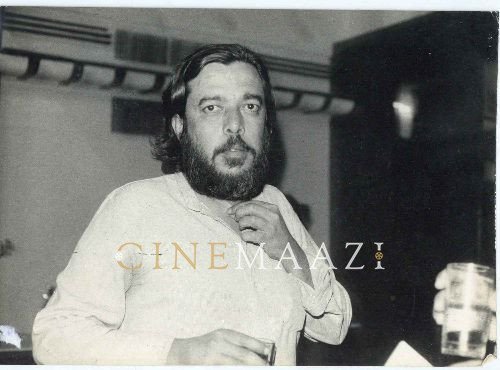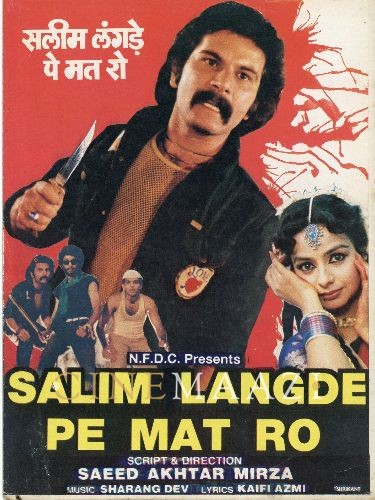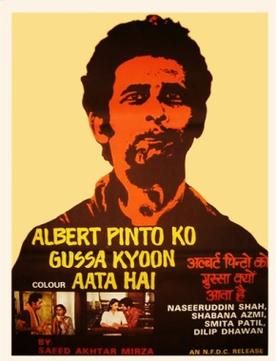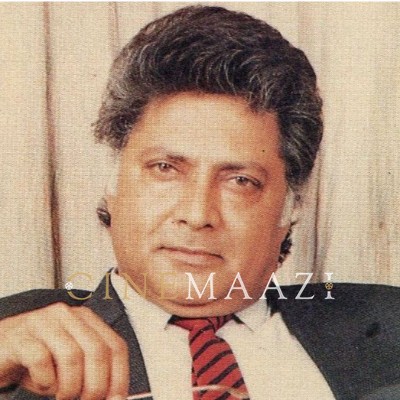Saeed Akhtar Mirza

Subscribe to read full article
This section is for paid subscribers only. Our subscription is only $37/- for one full year.
You get unlimited access to all paid section and features on the website with this subscription.
Not ready for a full subscription?
You can access this article for $2 , and have it saved to your account for one year.
- Real Name: Saeed Akhtar Mirza
- Born: 30/06/1943 (Bombay)
- Primary Cinema: Hindi
- Parents: Akhtar Mirza
- Spouse: Jennifer Mirza
- Children: Safdar Mirza, Zahir Mirza
“He invests the lower middle class with nobility, as in his movies. He invests the poor with real character, as in Nukkad,” wrote writer and columnist Aakar Patel of writer-director Saeed Akhtar Mirza. Creator of cult films that delve into the socio-economic realities of Mumbai and the angst of the marginalized and disenfranchised, he is also a pioneer of the New Wave progressive cinema in India. Mirza has directed such milestones of Indian cinema as Arvind Desai Ki Ajeeb Dastaan (1978), Albert Pinto Ko Gussa Kyon Aata Hai? (1980), Mohan Joshi Haazir Ho (1984), Salim Langde Pe Mat Ro (1989) and Naseem (1995). All his films have won major awards, including the National Film Awards. Co-founder of Yukt Film Co-op with K Hariharan, Mani Kaul, and Kamal Swaroop among others, his early films attempt a free-flowing narrative style partially influenced by Brazilian Cinema Novo, using vérité shots usually of Bombay’s working class. He started Iskra in collaboration with Kundan Shah, producing major TV series with each episode directed in turn by Mirza, Shah and colleagues like Raman Kumar and brother Aziz Mirza. He directed 17 of Nukkad (1986)’s 39 episodes, a drama series set on a Bombay street corner. He also made 11 of Intezaar (1988)’s 26 episodes, a drama series about life in the small town of Kamalpura. The group faced censorship trouble when Kundan Shah’s serial Police Station was denied telecast permission by Doordarshan. He also directed various documentary films on social welfare and cultural activism. He is also a trustee of ANHAD, a Delhi-based NGO working for communal harmony. He has penned four books – Ammi: Letter to a Democratic Mother; The Monk, the Moor and Moses Ben Jalloun; I Know the Psychology of Rats, and Memory in the Age of Amnesia: And other essays, tales, conversations, soliloquies and unsolicited advice: A personal history of our times. He has lectured widely on Indian cinema at universities in India and the US. He contributes regularly to Indian newspapers and magazines on current political debates and through film reviews. He is a life member of International Film And Television Club of Asian Academy of Film & Television.
Son of Akhtar Mirza, writer, actor and director, who is known for Naya Daur (1957), Waqt (1965) and Mohabbat Isko Kahete Hain (1965), Saeed Mirza was born on 30 June 1943 in Bombay. He started off working in advertising for some time, and went on to join the Film and Television Institute of India (FTII), Pune, India, from where he graduated in 1976. Later in his career, he would also teach at the Institute, and also become its chairman.
He began his career as a documentary filmmaker in 1976, with his rhetorical student documentary -An Actor Prepares featuring Om Puri. Graduating to films, he was part of a collective effort in direction and cinematography along with K Hariharan, Mani Kaul, and Kamal Swaroop, beginning with Ghashiram Kotwal (1976). The story tells the tale of Nanasaheb Phadnavis, the prime minister and real power of the Peshwa Maharaja, 1773-1797, and made a comment on contemporary Indian politics. Post-release, the film “disappeared from view shortly after being released in a theatre in Pune for a week.” It was screened at the Filmotsav in Madras in January 1978, and was subsequently selected for screening at the 1978 Berlin Film Festival. The film saw a revival in critical interest in recent years, with one reviewer writing: “Ghashiram Kotwal seems like a seminal work now, a crossroads in terms of ideological and aesthetic experimentation ...” Deemed a “remarkable avant-garde experiment in collective film-making,” the Encyclopaedia of Indian Cinema points out, “The film’s main significance resides in the way it adapts theatre to investigate cinema itself." Thirty-six years after it was first screened at Berlin, it was selected for screening in the Forum section of the 2014 Berlin Film Festival.
He would make his solo directorial debut with Arvind Desai Ki Ajeeb Dastan (1978), which earned him the Filmfare Award Best Film – Critics. Mirza co-wrote the film with Cyrus Mistry, with dialogue by Vijay Tendulkar. It starred Dilip Dhawan, Anjali Paigankar, and Shreeram Lagoo. The film revolved around Arvind Desai, the only son of a rich businessman, who deals in luxury handicraft products. His feelings for his father are mixed. While he hates the latter’s dominating nature, he also admires his power and lack of scruples. The film portrayed the frustrations of an idealistic youth caught in the trap of a feudal money culture.
Two years later, Mirza made waves with the comedy drama Albert Pinto Ko Gussa Kyon Ata Hai (1980), about an angry youth, in search of his class and ethnic identifications. It won the Filmfare Critics Award for Best Film. Starring Naseeruddin Shah as a man from Bombay, who is angry about various issues in different circumstances, the film also featured Shabana Azmi and Smita Patil. Mirza collaborated with Kundan Shah to pen the script of the film, assisted by Sudhir Mishra, which captured the anger of a worker in the city exemplified by a young Christian car mechanic.
Next in his series of films based on the urban middle class, came his directorial Mohan Joshi Hazir Ho! (1984). The film is a comic satire on the judicial system, where cases drag on for decades, with plaintiffs either dying or losing hope and money, while the corrupt run scot-free, thanks to their nexus with corrupt lawyers. It revolved around an old couple that struggles for years in their legal case that runs for years under a corrupt judiciary, in collusion with a real-estate developer. The film chronicled their struggles and search for identity amidst a rapidly changing landscape and economic conditions. It won the 1984 National Film Award for Best Film on Family Welfare. The ensemble cast of the film featured Naseeruddin Shah, Deepti Naval, Bhisham Sahni, Dina Pathak, Amjad Khan, Mohan Gokhale, Satish Shah and Rohini Hattangadi.
His angst-ridden Salim Langde Pe Mat Ro (1989) po rtrayed an archetypal Muslim youth caught in the circle of crime and recrimination. It voiced the collective state amidst growing communalism, ghetto mentality, and a search for an ethnic identity which does not clash with a national identity. Revolving around an unemployed Muslim youth who aspires to become a big-shot criminal, the film portrays him mending his ways with the help of his educated brother-in-law. Based on a screenplay by Mirza himself, with research by Manoj Lalwani and dialogue by Hriday Lani, the film starred Pawan Malhotra, Makrand Deshpande, and Ashutosh Gowariker. The film won Best Feature Film in Hindi and Best Cinematography at 37th National Film Awards.
Naseem, his feature which released in 1995, starred well-known Urdu poet and writer Kaifi Azmi, Mayuri Kango, Seema Kelkar, Surekha Sikri, Kulbhushan Kharbanda and Kay Kay Menon. It is set between June and December 1992, in the days preceding the demolition of the structure of the Babri Masjid at Ayodhya in Uttar Pradesh by Hindu fundamentalist groups. The relationship between Naseem, a 15-year-old schoolgirl belonging to a middle class Bombay-based Muslim family, and her ailing grandfather takes the story forward as the family watches with increasing horror on their TV the news of the growing tension between Muslims and Hindus. The grandfather keeps regaling her with stories of life marked by communal harmony in the pre-Independence city of Agra. As communal tension erupts in the city of Bombay, Naseem notices the changing dynamics at her school and in the neighborhood, while her grandfather watches helplessly at a city getting deeply divided on communal lines. The old man dies on 6th December, coinciding with the news of the destruction of the mosque. The film won Mirza the National Award for Best Direction and Best Screenplay. The film was featured in Avijit Ghosh's book, 40 Retakes, Bollywood Classics You May Have Missed.
Mirza would share, "The demolition of the Babri Masjid was the last straw. Naseem was almost like an epitaph. After the film, I had really nothing to say. I needed to regain my faith and retain my sanity. So I decided to travel around India and document it on a video camera.” He went on to devote his time to travelling, writing and making documentaries.
He later started on his autobiographical work, released in 2008, as his maiden novel named Ammi: Letter to a Democratic Mother which is about the memories of his mother who died in 1990 and a series of vignettes comprising Sufi fables, and childhood memories.
In 2009, his feature Ek Tho Chance released. A drama film, it starred Amrita Arora, Ali Fazal, and Uttam Halder. This film is a colourful mural of the lives of individuals from Bombay city's diverse cultural, social and economic strata.
Mirza also made documentaries about India for Doordarshan. They would be shot over many months, travelling with a young and mostly untested crew across the poorest parts of India, and staying where they could. He would later speak of how villagers in huts bare of furniture and vessels, with nothing but that day’s meal to call theirs, would offer the food to the crew with joy. While there wasn’t much money to be made in documentary filmmaking, he found the pleasure of discovering India and its stories, irresistible. Among the documentaries that Mirza made are Murde (1976) featuring Om Puri; Slum Eviction (1976) portraying the protests over clearing thousands of Bombay residents to make room for housing for a few hundred government officials; Urban Housing (1977); Piparsod (1982); The Rickshaw Pullers of Jabalpur (1984); Is Anybody Listening? (1987), We Shall Overcome (1988); and Ajanta and Ellora (1992)
His directorial work in the realm of television achieved high quality and huge popularity. Nukkad (1986) was set in the lower middle class of various communities, which meet at a street corner in Mumbai suburb, shared their struggle of everyday survival in a harsh world, and was a big hit.
His tele-serial Intezaar (1988) revolves around waiting: A mother waits for her son to return; the tangewala waits to save enough to buy an auto rickshaw; a young man from Ladakh waits to be in the mountains; and an assistant station master waits for love to happen. Set in the fictional village, Kamalpura, somewhere in north India, it wove the story and humour with music.
Other TV serials he directed include Manoranjan (1987) and Yeh Hai India Meri Jaan (2013), about the journey of a town girl across India trying to know about life of the common people of the country.
Saeed Mirza: The Leftist Sufi, a documentary on his life is available on OTT streaming channels. It is a lyrical documentary on India's most celebrated auteur of the 1970s through the mid-1990s.
Passionate about politics and the state of the world, he remains untouched by cynicism, and is remarkably optimistic about India, Indians and human beings. He is also “one of those rare intellectuals who is as interesting as his work… a first-rate teller of stories in whatever medium is at hand, film, television or print.”
References
https://www.imdb.com/name/nm0592595/bio?ref_=nm_ov_bio_sm
https://lifestyle.livemint.com/news/talking-point/the-life-and-times-of-saeed-mirza-111646986891697.html
https://www.livemint.com/Opinion/HUtQeTaUIBw2It2A7Cc8jM/Saeed-Mirza-a-seeker-storyteller-and-friend.html
https://indiancine.ma/RHB/info
https://www.indiatoday.in/magazine/society-and-the-arts/media/story/19880331-intezaar-retains-nukkad-cast-but-with-a-different-setting-797097-1988-03-30
Image courtesy: https://www.youtube.com/watch?v=kuB2B5FNmvM
-
Filmography (5)
SortRole
-
Naseem 1995
-











.jpg)



